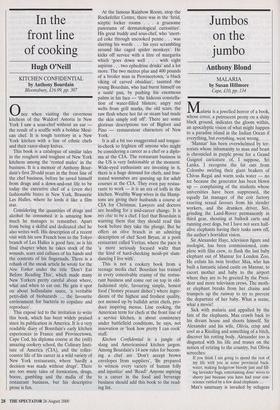In the front line of cooking
Hugh O'Neill
KITCHEN CONFIDENTIAL by Anthony Bourdain Bloomsbury, £16.99, pp. 307 nce when visiting the cavernous kitchens of the Waldorf Astoria in New York I saw a sous-chef without an ear the result of a scuffle with a bolshie Mexi- can chef. It is tough territory in a New York kitchen with a line of ethnic chefs and their razor-sharp knives.
This book is a catalogue of similar tales in the roughest and toughest of New York kitchens among the 'rented mules' in the business. It is a memoir of Anthony Bour- dain's first 20-odd years in the front line of the chef business, before he saved himself from drugs and a down-and-out life to be today the executive chef of a (even the) fashionable bistro in New York, Brasserie Les Hanes, where he lords it like a film star.
Considering the quantities of drugs and alcohol he consumed it is amazing how much he manages to remember. Apart from being a skilful and dedicated chef he also writes well. His description of a recent visit with his new French boss to the Tokyo branch of Les Halles is good fare, as is his final chapter when he takes stock of the wounds, scars and calluses of his hands and the contents of his fingernails. There is a rehash of the sneak article he wrote for the New Yorker under the title 'Don't Eat Before Reading This', which made many New Yorkers pretty careful about where, what and when to eat out. He gets it spot on about hollandaise sauce, 'a veritable petri-dish of biohazards ... the favourite environment for bacteria to copulate and reproduce'.
This exposé led to the invitation to write this book, which has been widely praised since its publication in America. It is a very readable diary of Bourdain's early kitchen experiences in France and Provincetown, Cape Cod, his diploma course at the (still) amazing cookery school, the Culinary Insti- tute of America (CIA), and the roller- coaster life of his career in a wild variety of New York restaurants, where 'hardly a decision was made without drugs'. There are too many tales of fornication, drugs, booze, gambling and the mafia of the restaurant business, but his descriptive prose is fun. At the famous Rainbow Room, atop the Rockefeller Centre, there was in the 'fetid, sceptic locker rooms . . . a gruesome panorama of dermatological curiosities'. His great buddy and sous-chef, who 'snort- ..ed coke through uncooked penne . . was slurring his words . . . his eyes scrambling around like caged spider monkeys'. He kicks off service with a litre of margarita which 'goes down well . . . with eight aspirins . . . two ephedrine drinks' and a lot more. The two metres plus and 400 pounds of a broiler man in Provincetown, 'a black viking of carved obsidian', taunted the young Bourdain, who had burnt himself on a sauté pan, by pushing his enormous palms in his face — 'the hideous constella- tion of water-filled blisters, angry red welts from grill marks, the old scars, the raw flesh where hot fat or steam had made the skin simply roll off. There are some glorious descriptions too of Bigfoot and Pino — restaurateur characters of New York.
It is all a bit too exaggerated and tongue- in-cheek to frighten off anyone who might be considering a career as a chef or a diplo- ma at the CIA. The restaurant business in the US is very fashionable at the moment. Wide-eyed enthusiasts are investing in it, there is a huge demand for chefs, and frus- trated wannabes are queuing up for adult courses at the CIA. They even pay restau- rants to work — it is an era of toffs in the kitchen. Wealthy Wasp wives in the Hamp- tons are giving their husbands a course at CIA for Christmas. Lawyers and doctors are heading for a mid-career change. It is tres chic to be a chef. I feel that Bourdain is warning them that they should read this book before they take the plunge. But he offers an olive branch in an admiring description of chef Scott Bryan, at a posh restaurant called Veritas, where the pace is `a more seriously focused waltz than the kind of hard-checking mosh-pit slam- dancing I live with'.
This is not a cookery book from a teenage media chef. Bourdain has trained in every conceivable cranny of the restau- rant business and come out on top in old- fashioned style, favouring simple, honest food (`homey peasant dishes') where ingre- dients of the highest and freshest quality, not messed up by bullshit artist chefs, pro- duce inspiring menus. Line cooking, the American term for chefs at the front line of a service kitchen, is about consistency under battlefield conditions, he says, not innovation or 'look how pretty I can cook' stuff.
Kitchen Confidential is a jungle of slang and Americanised kitchen jargon. Among Bourdain's 14 new rules for becom- ing a chef are 'Don't accept brown envelopes from suppliers', 'Be prepared to witness every variety of human folly and injustice' and 'Read!' Anyone aspiring to a career in the food and beverage business should add this book to the read- ing list.


























































 Previous page
Previous page